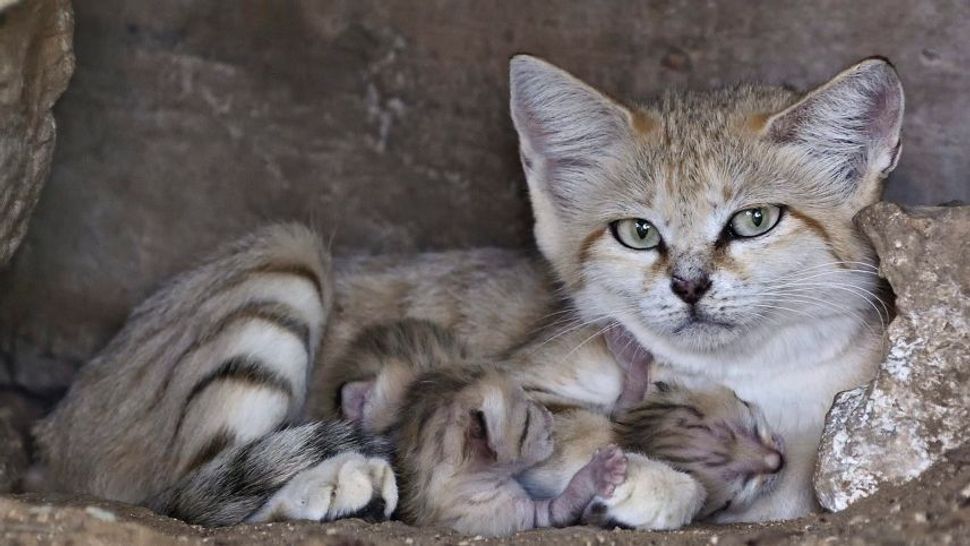Rare Sand Cat Stuns Israeli Zookeepers by Giving Birth — to Triplets

Image by Haaretz
It’s just as well for the sand cat species that personal taste isn’t a prerequisite for procreation, it seems. Rotem, the only surviving sand cat at the Ramat Gan Safari Park, lost her mate a year ago and seemed rather repulsed by Kalahari, his replacement, a sand cat imported from Sweden last September.
Maybe he put a bag on his furry head, because three weeks ago, to the astonishment of Rotem’s keepers, she gave birth to three kittens, who have now started to totter on their tiny legs beyond the nest.
“We had been extremely worried,” confessed Sigal Horowitz, spokeswoman of the Safari, which is officially called the Zoological Center of Tel Aviv. “Here we had gone to all this effort to bring her a mate, a full year ago, and nothing was happening. And these are critical years for sand cats – they don’t live forever.”
Sand cats are extremely endangered. Indigenous to Israel and Jordan, they are extinct in the region, though another sub-species may still exist in the desert wastes of North Africa. Of the local sand cat species, Felis margarita (also known as “dune cats”) only 200 remain – all in Europe’s zoos.
The cats are small, weighing between 1.5 to 3 kilos, large-eared, sand-colored and thrive in extreme desert conditions. They are also high on the list of animals that zoos around the world are cooperating to try to preserve. The hope is to be able to restore them to nature one day.
Friends without benefits?
So, when Rotem’s original mate Sela died, the Safari people began combing the world’s zoos for a replacement and last September, chose the husky male Kalahari, 3, from Sweden.
It was not love at first sight.
“We had expected that after the two young cats had met and been exposed one to the other properly, they would take to one another, but they didn’t,” says Horowitz. When put together during the day, the cats neither locked lips, nor talons for that matter. “They didn’t engage in hostile actions – they didn’t expose fangs, for instance,” she says. “What happened is we put them together – and nothing happened. They would look at one another but kept it platonic.”
Finally, reluctant to ask Sweden if their cat had a problem, and despite being concerned about war in the wee hours, the keepers decided to leave the cats shut up in the same room for the night.
“We don’t normally do that with sand cats because they’re so rare, and if they fight they could badly hurt each other,” Horowitz explains.
Lo, they did notice that Rotem had grown rather rotund. And three weeks ago, the keepers arriving for their day shift saw three furballs in Rotem’s den. She is proving to be an excellent mother, they say.
Her mating with Sela of blessed memory had occurred in the cats’ open area, because they hadn’t been left alone for the night, so Rotem’s two previous pregnancies (after 60-69 day gestation) had been anticipated. Nobody had observed the union with Kalahari, but there aren’t many other options to explain the kittens.
The absurdity that Israel has to import a sand cat endemic to Israel (Kalahari) from Sweden (flying on Turkish Airlines, via Istanbul) showcases the sad plight of our planet: many experts have been warning that mankind isn’t about to cause a sixth great extinction event. He already is.

I hope you appreciated this article. Before you go, I’d like to ask you to please support the Forward’s award-winning journalism this Passover.
In this age of misinformation, our work is needed like never before. We report on the news that matters most to American Jews, driven by truth, not ideology.
At a time when newsrooms are closing or cutting back, the Forward has removed its paywall. That means for the first time in our 126-year history, Forward journalism is free to everyone, everywhere. With an ongoing war, rising antisemitism, and a flood of disinformation that may affect the upcoming election, we believe that free and open access to Jewish journalism is imperative.
Readers like you make it all possible. Right now, we’re in the middle of our Passover Pledge Drive and we still need 300 people to step up and make a gift to sustain our trustworthy, independent journalism.
Make a gift of any size and become a Forward member today. You’ll support our mission to tell the American Jewish story fully and fairly.
— Rachel Fishman Feddersen, Publisher and CEO
Join our mission to tell the Jewish story fully and fairly.
Only 300 more gifts needed by April 30
























